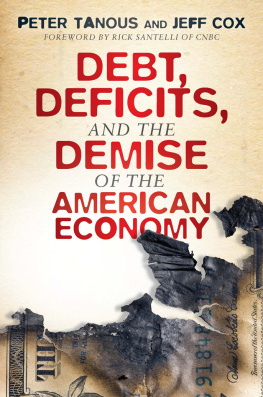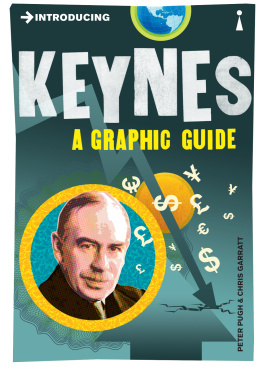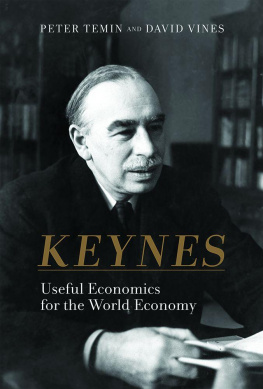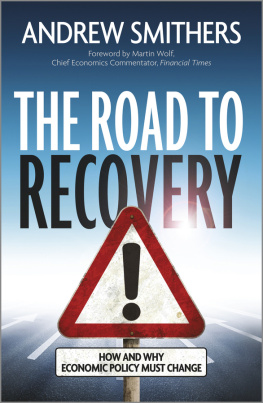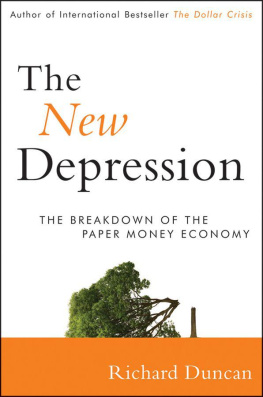Beyond the Keynesian Endpoint
Crushed by Credit and Deceived by Debt
How to Revive the Global Economy
Tony Crescenzi
Vice President, Publisher: Tim Moore
Associate Publisher and Director of Marketing: Amy Neidlinger
Acquisitions Editor: Jeanne Glasser
Editorial Assistant: Pamela Boland
Senior Marketing Manager: Julie Phifer
Assistant Marketing Manager: Megan Graue
Cover Designer: Chuti Prasertsith
Managing Editor: Kristy Hart
Senior Project Editor: Lori Lyons
Copy Editor: Language Logistics, LLC
Proofreader: Apostrophe Editing Services
Indexer: Lisa Stumpf
Senior Compositor: Gloria Schurick
Manufacturing Buyer: Dan Uhrig
2012 by Tony Crescenzi
Pearson Education, Inc.
Publishing as FT Press
Upper Saddle River, New Jersey 07458
This book is sold with the understanding that neither the author nor the publisher is engaged in rendering legal, accounting, or other professional services or advice by publishing this book. Each individual situation is unique. Thus, if legal or financial advice or other expert assistance is required in a specific situation, the services of a competent professional should be sought to ensure that the situation has been evaluated carefully and appropriately. The author and the publisher disclaim any liability, loss, or risk resulting directly or indirectly, from the use or application of any of the contents of this book.
The views contained herein are the authors but not necessarily those of PIMCO. Such opinions are subject to change without notice. This publication has been distributed for educational purposes only and should not be considered as investment advice or a recommendation of any particular security, strategy or investment product. Information contained herein has been obtained from sources believed to be reliable, but not guaranteed.
Nothing contained herein is intended to constitute accounting, legal, tax, securities, or investment advice, nor an opinion regarding the appropriateness of any investment, nor a solicitation of any type. This publication contains a general discussion of economic theory and the investment market place; readers should be aware that all investments carry risk and may lose value. The information contained herein should not be acted upon without obtaining specific accounting, legal, tax, and investment advice from a licensed professional.
FT Press offers excellent discounts on this book when ordered in quantity for bulk purchases or special sales. For more information, please contact U.S. Corporate and Government Sales, 1-800-382-3419, . For sales outside the U.S., please contact International Sales at
.
Company and product names mentioned herein are the trademarks or registered trademarks of their respective owners.
All rights reserved. No part of this book may be reproduced, in any form or by any means, without permission in writing from the publisher.
Printed in the United States of America
First Printing October 2011
Pearson Education LTD.
Pearson Education Australia PTY, Limited.
Pearson Education Singapore, Pte. Ltd.
Pearson Education Asia, Ltd.
Pearson Education Canada, Ltd.
Pearson Educatin de Mexico, S.A. de C.V.
Pearson EducationJapan
Pearson Education Malaysia, Pte. Ltd.
ISBN-10: 0-13-259521-4
ISBN-13: 978-0-13-259521-6
To my enchanting daughters, Brittany, Victoria, and Isabella.
Each of you adds immeasurable joy and happiness to my life.
I love each of you so much and dedicate my life to you.
To my brother and sisters and to my nurturing parents,
Anita and Joseph, for their unconditional love and for the freedoms
I was given in youth to explore, to dream, and to have funlots of it!
To Jeffrey Tabak and Jeffrey Miller for their friendship and for giving
me the freedom to probe all boundaries of the financial markets,
the economy, and the investment world.
To Bill Gross and Mohamed El-Erian, for whom I have deep respect,
for the opportunity of a lifetime to work for them and contribute to
PIMCO, an organization I am honored to be a part of.
To friends we gain in the many stages of our lives,
for the great comfort, joy, and enduring memories they give us.
Thank you to my old and new friends,
Jackie Rubino, Neil Visoki, Tommy Scott, Jeanine Ognibene,
John Barone, Diana Mangano, John Vito Pietanza,
Ray and Debbie Candido, Dave Bochicchio, Phil Neugebauer,
Mark Shorr, and Mark Porterfield.
To all who, in one way or another, are survivors, and who, despite the
many obstacles and challenges they face in their daily lives,
each day find the inner strength to endure and indeed to excel.
About the Author
Tony Crescenzi is an Executive Vice President, Market Strategist, and Portfolio Manager at PIMCO in its Newport Beach office. Prior to joining PIMCO in 2009, he was Chief Bond Market Strategist at Miller Tabak, where he worked for 23 years. Mr. Crescenzi has written four other books, including a 1,200-page revision to Marcia Stigums classic, The Money Market, in 2007. He regularly appears on CNBC and Bloomberg television and in financial news media.
Mr. Crescenzi taught in the executive MBA program at Baruch College from 1999-2009. He has 28 years of investment experience and holds an MBA from St. Johns University and an undergraduate degree from the City University of New York.
Introduction: Reaching the Keynesian Endpoint
After the fall of Lehman Brothers in September 2008, the scope of the financial crisis became so great that the fiscal and monetary authorities of the developed world possessed the only balance sheets large enough to resolve the crisis and thereby restore stability to the worlds financial markets and the global economy. In essence, the ills of the private sector were set to shift to the public sector. The sense at the time was that it would work; after all, the borrowing abilities of the United States and the rest of the developed world were proven, and the ability of central banks to print money was and remains indisputable. Moreover, Keynesian economics had succeeded at restoring stability to ailing economies before through the elixir of government borrowing and spending ever since John Maynard Keynes pioneered the concept during the Great Depression. Nevertheless, there was a sense of discomfort in the supposed solution.
After Lehman fell, I posed a question, calling it the question of our age: If the Unites States is backing its financial system, who is backing the United States? The basic premise rested on the idea that efforts to stabilize economies and markets were likely to work if investors tolerated the additional debt the efforts required. If not, there would be financial Armageddon. The direst outcome was of course avoided, but dark days have smitten many nations, including Portugal, Ireland, and Greece, and the gloom is threatening to spread to the world at large, where sovereign debt threatens financial calamity for nations whose actions over many decades have left them teetering on the edge of a cliff, clinging by their nails, pulling ever-downward toward an unforgiving and impervious landing below. The grim fate of the indebted, once viewed as unfathomable, is increasingly seen as possible because the magic elixir of Keynesian economics has morphed into poison.
Nations have reached, in other words, the Keynesian Endpoint, where there are no private sector or public sector balance sheets left to fuel economic activity and rescue the worlds financial system. This is not literally true but true in practice because investors at the present time have no tolerance for fiscal profligacy or any form of government borrowing geared toward reviving weakness in private sector demand, especially if the lapses in demand are the result of the private sectors effort to reduce its own indebtedness. There is also little appetite for the monetization of deficits by the worlds central banks.


